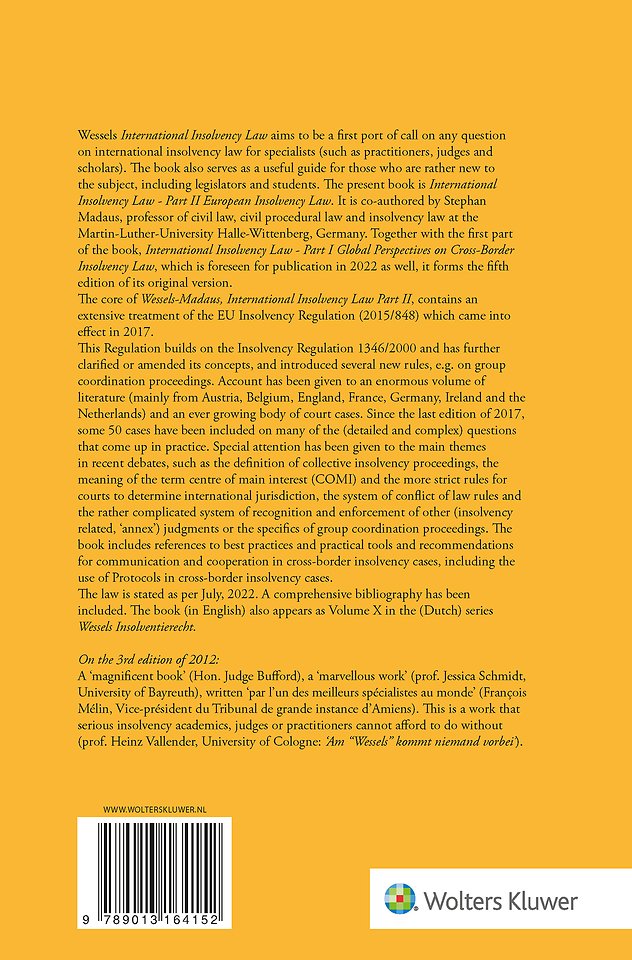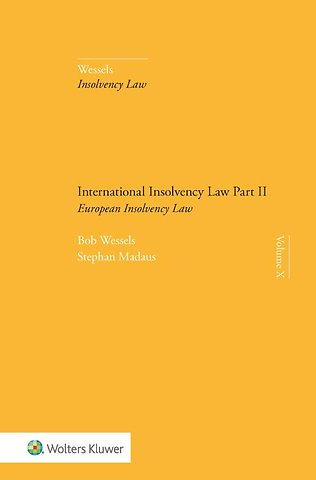



Bob Wessels is Professor Emeritus of International Insolvency Law at the University of Leiden (The Netherlands).
Meer over de auteursInternational Insolvency Law Part II
European Insolvency Law
Gebonden Engels 2022 5e druk 9789013164152Samenvatting
international Insolvency Law – Part II European Insolvency Law offers a crystal clear treatment on both fundamental and current matters in cross-border insolvency law. The book offers a thought-provoking read for specialists, while also serving as a friendly introduction to those new to the subject. A must-read for anyone in the field.
International Insolvency Law offers students, academics and practitioners an authoritative and practical guide on the European laws of international insolvency. It rigorously explores and clarifies the vast increasing body of legislative rules, case law, scholarly literature and other available sources. The fourth edition has been completely updated to cover recent developments in European Insolvency Law.
The book offers both depth and clarity, serving as a proper introduction and deeper exploration of the subject. International Insolvency Law has received critical acclaim from practitioners, judges and scholars alike. This is one of those reads no insolvency specialist and academic can do without.
Fourth edition of International Insolvency Law
This fourth edition now includes a detailed commentary of the recast of the Insolvency Regulation, which came into legal effect 26 June 2017. In addition to fundamental issues, the book covers over 300 contemporary court cases, exquisitely bringing the material to life. It includes cases related to Alitalia, Lehman Brothers, Nortel Network, Olympic Airlines and several cases on director’s liability and transaction avoidance cross-border decided by the Court of Justice of the European Union.
Met with critical acclaim
The previous edition of International Insolvency Law has received wide praise from judges and lawyers, as well as academics. The work is recognized for its clarity and rigorous analysis of the many issues, rules and concepts surrounding European insolvency law.
‘A magnificent book,’ says the Hon. Judge Samuel L. Bufford (Pennsylvania State University). Professor Jessica Schmidt (University of Bayreuth) called it a ‘marvelous work.’
Trefwoorden
Specificaties
Lezersrecensies
Over Stephan Madaus
Inhoudsopgave
Preface to the fourth edition / IX
Preface to the third edition / XIII
Preface second edition (2006) / XVII
Preface first edition (2003) / XXI
Detailed Content / XXIX
List of abbreviations / LXI
Bibliography / LXIX
Table of cases / CCI
Table of CJEU cases – sorted by case number / CCXXIX
Table of legislation / CCXXXIII
I. EU INSOLVENCY REGULATION / 1
§ I.1 Introductory remarks / 1
§ I.2 Genesis / 26
§ I.3 Scheme / 32
§ I.4 Territorial reach / 34
§ I.5 Substantive scope / 39
§ I.6 The model of the Insolvency Regulation / 42
§ I.7 Interpretation / 46
§ I.8 Adoption / 58
II. GENERAL PROVISIONS / 63
§ II.1 Scope and definitions / 63
§ II.2 International jurisdiction / 142
§ II.2.1 Centre of main interests / 146
§ II.2.2 Principle of mutual trust / 158
§ II.2.3 Individuals / 163
§ II.2.4 The presumptions of Article 3(1) / 180
§ II.2.5 Burden of proof / 197
§ II.2.6 Registered office outside the EU / 201
§ II.2.7 Reference date / 205
§ II.2.8 Treatment of multinational groups of companies / 218
§ II.2.9 Preservation measures / 258
§ II.2.10 International jurisdiction for other decisions / 260
§ II.2.11 Territorial proceedings / 260
§ II.3 Examination of international jurisdiction / 272
§ II.3.1 Examination as to international jurisdiction / 273
§ II.3.2 Challenge of the decision to open main insolvency proceedings / 281
§ II.3.3 International jurisdiction for annex- and related-actions / 286
§ II.4 Applicable law / 298
§ II.5 Exceptions to the applicability of the lex concursus / 321
§ II.6 Rights in rem of third parties / 331
§ II.7 Set-off / 354
§ II.8 Reservation of title / 363
§ II.9 Current reciprocal contracts / 369
§ II.10 Contracts relating to immoveable property / 377
§ II.11 Payment systems and financial markets / 382
§ II.12 Contracts of employment / 385
§ II.13 Rights subject to registration / 396
§ II.14 Protection of a third-party acquirer / 398
§ II.15 Pending lawsuits or arbitral proceedings / 402
§ II.16 European patents with unitary effect and Community trade marks / 417
§ II.17 Detrimental acts / 419
III. RECOGNITION OF INSOLVENCY PROCEEDINGS / 439
§ III.1 Principle of automatic recognition of judgments / 439
§ III.2 Consequences of the recognition of main insolvency proceedings / 454
§ III.3 Consequences of recognition of territorial proceedings / 458
§ III.4 Powers of the insolvency practitioner / 460
§ III.5 Obligation by a creditor to return / 473
§ III.6 ‘Hotchpot’-rule / 476
§ III.7 Insolvency registers / 479
§ III.8 Opening insolvency proceedings: publication, registration and costs / 488
§ III.9 Honouring an obligation to a debtor / 495
§ III.10 Recognition and enforceability of other judgments / 498
§ III.11 Recognition and enforcement of judgments deriving from insolvency proceedings / 501
§ III.12 Recognition and enforcement of preservation measures / 519
§ III.13 Public policy / 523
IV. SECONDARY INSOLVENCY PROCEEDINGS / 537
§ IV.1 Introductory remarks / 537
§ IV.2 Avoiding opening of secondary proceedings: an undertaking / 551
§ IV.3 Opening of secondary proceedings / 574
§ IV.3.1 Right to request opening of secondary proceedings / 574
§ IV.3.2 Opening secondary insolvency proceedings and the stay / 581
§ IV.3.3 Judicial review of the decision to open secondary insolvency proceedings / 592
§ IV.3.4 Advance payment of costs and expenses / 595
§ IV.4 Cross-border cooperation and communication / 596
§ IV.4.1 Cooperation and communication between insolvency practitioners / 623
§ IV.4.2 Cooperation and communication between courts / 635
§ IV.4.3 Cooperation and communication between insolvency practitioners and courts / 641
§ IV.4.4 Cost of cooperation and communication / 643
§ IV.5 Exercising of creditors’ rights / 644
§ IV.6 Stay of process of realisation of assets / 655
§ IV.7 Measures ending secondary insolvency proceedings / 663
§ IV.8 Procedural entanglements / 670
§ IV.9 Powers of a temporary administrator / 675
V. PROVISION OF INFORMATION TO CREDITORS AND LODGEMENT OF THEIR CLAIMS / 681
§ V.1 Right to lodge claims / 681
§ V.2 Duty to inform creditors / 690
§ V.3 Procedure for lodging of a claims / 696
VI. INSOLVENCY PROCEEDINGS OF MEMBERS OF A GROUP OF COMPANIES / 703
§ VI.1 Introductory remarks / 703
§ VI.2 Cooperation and communication / 705
§ VI.3 Group coordination proceedings / 716
§ VI.4 Group coordinator / 740
VII. DATA PROTECTION / 765
VIII. TRANSITIONAL AND FINAL PROVISIONS / 769
§ VIII.1 Transitional law / 769
§ VIII.2 Relationship to existing conventions and treaties between Member States / 774
§ VIII.3 Remaining final provisions / 777
Appendices / 781
Appendix I Regulation (EU) 2015/848 of the European Parliament and of the Council of 20 May 2015 on insolvency proceedings (recast) / 783
Appendix IA Transposition Table – recitals EIR 2000 (Regulation 1346/2000) - EIR 2015 (Recast) (Regulation 2015/848) / 855
Appendix 1B Regulation (EU) 2021/2260 amending Regulation (EU) on insolvency proceedings to replace its Annexes A and B / 857
Appendix II Council Regulation (EC) No 1346/2000 of 29 May 2000 on insolvency proceedings / 867
Appendix III European Communication and Cooperation Guidelines for Cross-border Insolvency (‘CoCo Guidelines’) (October 2007) / 891
Appendix IV EU Cross-Border Insolvency Court-to-Court Cooperation Principles (‘EU JudgeCo Principles’) and EU Cross-Border Insolvency Court-to-Court Communications Guidelines (‘EU JudgeCo Guidelines’) (December 2014) – Introduction / 899
Eu cross-border insolvency court-to-court cooperation principles / 903
Eu cross-border insolvency court-to-court communications guidelines / 913
Appendix V Recommendations for Protocols in Group Insolvencies / 919
Anderen die dit boek kochten, kochten ook
Rubrieken
- advisering
- algemeen management
- coaching en trainen
- communicatie en media
- economie
- financieel management
- inkoop en logistiek
- internet en social media
- it-management / ict
- juridisch
- leiderschap
- marketing
- mens en maatschappij
- non-profit
- ondernemen
- organisatiekunde
- personal finance
- personeelsmanagement
- persoonlijke effectiviteit
- projectmanagement
- psychologie
- reclame en verkoop
- strategisch management
- verandermanagement
- werk en loopbaan





